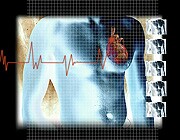Defibrillators Don't Diminish Quality of Life
But the shocks they produce can signal danger, researchers say.
By Ed Edelson
HealthDay Reporter
|
E-mail this article
Subscribe to news
Printer friendly version
|

(SOURCES: Daniel B. Mark, M.D., M.P.H., professor, medicine, Duke University Medical Center, Chapel Hill, N.C.; Jeanne E. Poole, M.D., professor, medicine, University of Washington, Seattle; Marie-Noelle Langan, M.D., electrophysiologist, Lenox Hill Hospital, New York City; Sept. 4, 2008, New England Journal of Medicine)
WEDNESDAY, Sept. 3 (HealthDay News) -- Getting an implanted defibrillator that can deliver a shock to restart a failing heart not only prolongs life but also doesn't appear to detract from the quality of life, a new study finds.
The study was done "not only to see whether or not lives would be saved but also the quality of those lives," said lead author Dr. Daniel B. Mark, a professor of medicine at Duke University Medical Center. "We wanted to know whether patients who will have these devices for many years would be satisfied with them."
Mark and his colleagues reviewed results of a 30-month study whose primary purpose was to measure whether implanted defibrillators reduced deaths among 2,521 people with heart failure, a life-threatening condition in which the heart progressively loses the ability to pump blood. All the participants got standard drug treatment for the condition. And one-third of them had defibrillators implanted, one-third were also given the rhythm-restoring drug amiodarone, and one-third got a placebo.
All the participants had about the same scores on tests of psychological well-being at the start of the study. Subsequent interviews found that those with the defibrillators had somewhat higher scores at three and 12 months, and there were no differences in psychological outlook at 30 months.
"Keeping in mind that they all have chronic heart failure, there is no evidence that defibrillators make anything worse," Mark said.
But caution is needed in interpreting the study, he said, because it couldn't achieve the desired goal of being "double-blind" -- with neither patient nor doctor knowing who was getting which treatment. The early positive reports by those with defibrillators "could have been due to the fact that they got some positive feedback from having been selected for the defibrillator arm of the trial," he said.
Something else to consider was the patients' sobering introduction to the study, Mark said. "They were told they faced sudden death. That is a conversation they probably had not had before, being told there is a good chance you could just keel over one day with no significant warning," he noted.
Actually getting a heart-restarting shock made people feel worse, Mark noted. "We don't know if it was the shock itself or the condition that created the need for the shock," he said.
The findings are published in the Sept. 4 issue of the New England Journal of Medicine.
There were serious worries about the effect of implanted defibrillators on recipients' feelings of well-being when the devices were first introduced about two decades ago, said Dr. Marie-Noelle Langan, an electrophysiologist at Lenox Hill Hospital in New York City.
"There were definite reasons for worry," Langan said. "First, a defibrillator is a physical reality. It cannot be ignored as a medication can be. Second, the shocks delivered by early models could be very bothersome."
Worries have eased as the technology has advanced, she said. "Defibrillators have become much more sophisticated," Langan said.
Another paper in the same issue of the journal showed vividly that getting a defibrillator shock is grounds for worry. In a study of 829 heart-failure patients with implanted defibrillators, researchers found that 269 received at least one shock over a period of 45.5 months. Of these, 128 got shocks that were medically warranted, 87 got "inappropriate" shocks, and 54 received both kinds.
Getting an appropriate shock was a serious sign of trouble, increasing the risk of subsequent death more than fivefold, compared to not getting a shock. But even an inappropriate shock nearly doubled the risk of death. For those who lived longer than 24 hours after an appropriate shock, the risk of death during the study was nearly tripled, the researchers found.
The study shows that "we can now define a group of patients at higher risk of dying of heart failure," said study author Dr. Jeanne E. Poole, a professor of medicine and director of electrophysiology at the University of Washington.
Special measures are needed for anyone getting an appropriate shock, because it shows a potentially fatal heart rhythm abnormality, Poole said. The steps to be taken depend on an analysis of each patient's needs, she said.
More information
Learn more about implanted defibrillators from the U.S. National Heart, Lung, and Blood Institute.
Copyright © 2008 ScoutNews, LLC. All rights reserved. 
HealthDayNews articles are derived from various sources and do not reflect federal policy. healthfinder.gov does not endorse opinions, products, or services that may appear in news stories. For more information on health topics in the news, visit the healthfinder.gov health library.